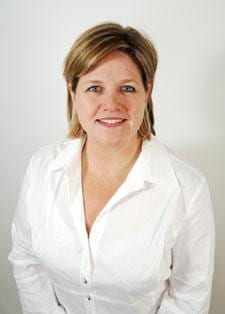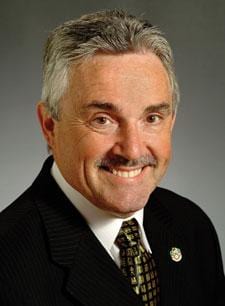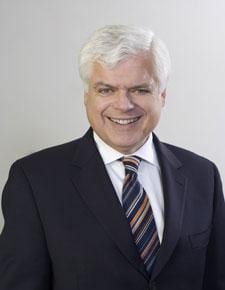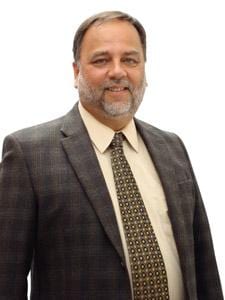
ANDREA HORWATH

MICHAEL PRUE

PETER TABUNS
In early March members of Ontario’s New Democratic Party will gather in Hamilton for the first leadership convention since Howard Hampton replaced one-time NDP premier Bob Rae in 1996. Four candidates will vie for the top job — Gilles Bisson, MPP for Timmins-James Bay; Andrea Horwath, MPP for Hamilton Centre; Michael Prue, MPP for Beaches-East York; and Peter Tabuns, MPP for Toronto-Danforth.
None of the candidates are queer but, as one would expect from a party that claims to represent the left, they all support queer rights. So does it really matter to ‘mos which one of them wins?
Queer supporters in the various camps say the real question is who can reinvigorate the party, win voters back and take a larger share of the seats in the 2011 general election.
“The biggest thing for me is reengaging people,” says longtime queer activist and Horwath supporter Deb Parent. “Revitalizing the party but also reengaging people with their own ability to make a difference. If we have people passionate about making social change there’s nothing we can’t do.”
“I’m tired of being the conscience of Queen’s Park,” says Tanya Speight, former cochair of the Ontario NDP’s LGBT Committee and Prue supporter, “so who’s in the best position to make that happen [form the government]?”
“Our party’s at a real point where we have to make big changes or there’s not going to be a provincial NDP,” says Tabuns supporter and current LGBT rep to the provincial executive Jay Yerex, pointing to the party’s approximately $4-million debt and poor showing in the last three elections.
Of course the spectre of Bill 167 continues to haunt the NDP when it comes to garnering queer support. In 1994 the NDP, then led by Rae, introduced legislation that would have extended many spousal rights to same-sex couples in the province. Despite the fact that the party had a majority and could have ensured the bill’s passage, Rae allowed a free vote on the issue. Twelve members of the NDP — a group that came to be known as the Dirty Dozen — voted against the bill. It was defeated 59 to 68.
Of the current leadership candidates only Bisson was in the legislature at the time of the disastrous free vote on Bill 167; he voted in favour of extending rights to same-sex partners.
But despite the fact that many queers have seemingly forgiven Rae — he took the Toronto Centre riding, which includes Toronto’s gay village, with more than 53 percent of the vote — there is a lingering resentment toward the party itself.
“A lot of queer people just don’t trust the NDP since Bob Rae,” says Yerex.
“I’m proud that the NDP introduced the legislation,” says Speight. “I just wish it hadn’t been made a free vote.”
So who are these four candidates who are vying to take the reins and reestablish the NDP as the party of choice for queer Ontarians?
GILLES BISSON
Quick hit: Bisson, a Franco-Ontario born and raised in Timmins, is the longest-serving MPP among the candidates, having been first elected in 1990. Under the Rae government he was parliamentary assistant to the ministers of Northern Development and Mines and Francophone Affairs. Currently he serves as the party’s critic on Francophone Affairs, Ministry of Natural Resources, Transportation and Native Affairs, as well as being the caucus whip. Prior to his career in provincial politics Bisson worked for the Ontario Federation of Labour.
Word from a queer in his corner: “For Gilles being a politician, it’s about changing the world,” says Timmins-based activist Georgie Sabourin. “He’s very passionate and he’d do an excellent job. He’s passionate about the issues. He’s worked in the north trying to advance the situation as far as first nations people are concerned…. He bought himself a plane and learned how to fly so that he would get up there more often. That’s the kind of dedication he has.”
Bisson on winning queers back to the party after the betrayal of Bill 167:
“First of all I voted in favour of Bill 167. Back in the early ’90s I thought then as I do now that in our society we need to be respectful of all people and the lives they live…. You can guarantee from me by my record I’ve always been seen as a supporter of the rights of individualism so the majority does not override the rights of the individual.”
On what issues are of concern to queer voters in Ontario:
“One of them is the issue of making sure we accept people as who they are. There is still a large struggle for some people who are gay and come out, there are still repercussions. To say that there isn’t is putting our hands over our eyes and our fingers in our ears.”
On provincially funding sexual reassignment surgery:
“I’ve always been in favour. A person doesn’t choose to do this, it’s who they are.” Bisson adds that the previous system of administration was “unduly hard.”
“There are a lot of barriers to get there because of the biases in the system that try to prevent people from moving on with that decision.”
On extending Ontario’s Human Rights Code to explicitly protect trans people:
“Absolutely. We know prejudice is alive and well in society and for us to pretend not is a disservice to people who need our protections, not only in the Human Rights Code but also in the Criminal Code.
“You cannot physically, verbally, mentally abuse people in regards to who they are. We wouldn’t accept it in terms of race, why would we accept it in regards to anyone else?”
On addressing discrimination and violence directed against queer people in Ontario:
“It’s a question of having open discussion…. We have to be open about these issues in the public.
“Some may disagree, but I would argue that in the secondary school level and maybe as early as Grade 7 Grade 8 we have to have these discussions, [to teach kids that] if you live in a civilized society as we do in Ontario and in Canada, you have to respectful of people.”
On addressing homophobic and transphobic bullying in Ontario’s schools:
Bisson says the key is to incorporate an understanding and acceptance of queer and trans people into the curriculum. “A government has to be proactive so that we know 15 to 20 years from now society is going to be better than it was for this generation.”
ANDREA HORWATH
Quick hit: Born in Stoney Creek, Horwath was elected as Hamilton Centre MPP in a byelection in 2004. She is the party critic for Municipal Affairs, Government and Consumer Services, Children and Youth, Occupational Health and Safety, Women’s Issues and Economic Development and Trade as well as Deputy Deputy Speaker. Before her jump to provincial politics she served as a Hamilton city councillor from 1997 to 2004. Prior to that she worked as a grassroots organizer, winning the honour of Hamilton’s Woman of the Year in Public Affairs in 1996.
Word from a queer in her corner: “For me Andrea is the new face of the NDP,” says Parent. “In my opinion she’s the face that speaks to disenfranchised communities, that speaks to women, GLBT people, people of colour, seniors, disabled people, poor people. And if we do not put a strong new fresh face to the party, we will not be able to bring people back.
“I believe that Andrea has the energy has the experience to bring communities to the table and to get things done. I think she’s got a record of accomplishment that reflect that. For me Andrea is a candidate with tremendous broad-based experience and as an activist I value her commitment and her understanding of how important it is to build the party from the ground up.”
Horwath on winning queers back to the party after the betrayal of Bill 167:
“I wasn’t there when that bill was debated, I wasn’t there when it went down. I bring something different to the party. I don’t have that baggage if you will. I believe my personal experience and history supporting the LGBT community in Hamilton and elsewhere will speak for itself.”
On what issues are of concern to queer voters in Ontario:
“I would say their issues are those that everybody else has as well, issues of jobs, of the economy, the environment, of rights and making sure that we move forward in a progressive way on LGBT issues.
“I would never presume to speak on behalf with the LGBT community without having that discussion. It’s not about me having the answers… I used to be a grassroots organizer in Hamilton doing social justice work so I’ve never been of the perspective that leadership is about coming up with ideas on your own. It’s about talking to people and finding out their issues.”
On provincially funding sexual reassignment surgery:
“Absolutely, not only in terms of making sure it’s covered by OHIP — everything from day one is covered, everything through the process including things like counseling… but it’s also about access, geographic access. I know the community in Hamilton has issues about not having access. I’m in Sudbury right now and I can tell you I’m sure there’s not a lot of access here. There’s real action that needs to be taken to ensure people have support all the way through — financial support but also that they have access to that support.”
On extending Ontario’s Human Rights Code to explicitly protect trans people:
“I’m absolutely supportive. It’s long past time that we have legislated changes in Ontario and in Canada.”
On addressing discrimination and violence directed against queer people in Ontario:
“There continues to be a necessity for speaking out and bringing these issues to the public light…. It’s not just in more rural or remote communities. We’ve had some horrendous issues in Hamilton actually… and I’ve been there as an elected official decrying the violence and making sure that the issue isn’t hidden and swept under the carpet. It’s important that community leaders take action. If we’re not ready to speak out against it that speaks volumes.
“I think it’s everyone’s responsibility that the voice is brought to the table that violence isn’t something that can be perpetrated without public outcry. Not just traditional ‘education’ but full community acknowledgment and voice when these things occur. Of course there needs to be proper follow up from police and law enforcement… making sure that there is awareness and commitment to dealing with these kinds of crimes that is suiting in terms of proper charges and follow up. Without that these things continue to occur without repercussions and people continue to be at risk which is completely unacceptable.”
On addressing homophobic and transphobic bullying in Ontario’s schools:
“It continues to be problematic and it’s often reflective of what’s happening in the broader community…. There is opportunity to be more proactive in the school system particularly at the high school level and even at the grade school level. We need to be prepared to have the dialogue with young people at an early age or we’ll continue to see them sucked into stereotypical behaviour that is transphobic and homophobic. I’m not a curriculum developer so I don’t know what the appropriate age would be, when you’d start to introduce it into the community, but it has to be done. We have so far to go still. We can’t have generation after generation going through the system not being educated… about where people are coming from and what people’s orientation is and the basic human rights around that. It’s amazing that in such a progressive country and province that we’re not being proactive to ensure that’s being respected across our society.”
MICHAEL PRUE
Quick hit: Prue won the Beaches-York riding in a byelection in 2001 to replace longtime NDP MPP Frances Lankin. He is the party critic for Community and Social Services, Democratic Renewal, Finance, Research and Innovation and Revenue. He first entered politics in 1988 when he was elected as a councillor in what was then the city of East York; he later served as mayor from 1993 until ’97, when East York amalgamated with the City of Toronto. Previous to his life in politics he worked as counsel to the Minister of Employment and Immigration.
Word from a queer in his corner: “His focus is really on bringing democracy, stronger democracy to the party by allowing tricky debates to take place,” says Speight.
“Prue took Leaside which is the Tory-blue area of his riding… he took every poll. If he can take all of Tory-blue Leaside, he can take any riding in Ontario. The issues are one thing and he’s strong on the issues but he can give us the voice in government and not just opposition.”
Prue on winning queers back to the party after the betrayal of Bill 167:
“Just by explaining how we are on board in all of the issues of gay rights…. I was disappointed along with everyone else, being a mayor [of East York] back in ’94 and seeing what was happening. One could only feel upset and ashamed when the NDP backed down and made it a free vote knowing full well that some of its members would vote the other way. There was no reason for it to have been a free vote. It should have been a whipped vote. The NDP certainly had a majority to see it through.
“A number of olive branches have been laid. New Democrats come out in numbers to gay-sponsored events, not just the gay Pride parade. We turn out. My team is made up of many gay individuals. We speak the same language, we talk about the same rights. I’m convinced that a number of people who left us momentarily have come back.”
On what issues are of concern to queer voters in Ontario:
“There has been a fair amount of debate and questions asked in the all-candidates meetings about trans people, about the medical opportunities being made available to them. I do acknowledge that the Liberals have reinstituted the possibility of medical procedures but there are others that to the uneducated ear would seem rather strange. One was the issue of electrolysis for men becoming women… and that is not covered. I’ve had some good discussions with [trans activist] Susan Gapka and others and it’s a relatively minor cost and it seems to me the state should be bearing that cost.
“Other issues, it seems to be fairly quiet at this stage. People seem to be content with the [current] directions, they certainly don’t want to go back in any way and certainly defence of human rights is high on the list of the LGBT community and that’s what we as New Democrats do.”
On provincially funding sexual reassignment surgery:
“Absolutely. A person should be who a person is. It’s a pretty easy concept. Once you accept a person should be what they are the rest falls into place.”
On extending Ontario’s Human Rights Code to explicitly protect trans people:
“Absolutely, because when you see the level of violence meted out to some of them it’s much much higher than the general population, it’s much higher than any other identifiable group. So you have to reach out to protect those who are most vulnerable and there’s no doubt in my mind that trans people fit that category.”
On addressing discrimination and violence directed against queer people in Ontario:
“We have all the instruments of government available, it’s just a matter of using them, everything from the human rights code to the ombudsman’s office, the courts, everything has to be used. A crime against LGBT [people] or anyone is a crime against human rights, it’s a crime against humanity. I think most people understand that. And although there is still some discrimination — and I’m not naïve, I do hear it from time to time, particularly among older people — it is lessening and as people are given better and better understanding those old feelings are going.”
On addressing homophobic and transphobic bullying in Ontario’s schools:
“First thing you have to do is end bullying of all types in our schools. Homophobic bullying is not to be tolerated. You try to counsel kids — and I don’t think most kids are naturally inclined to be that way, they learn it from their parents or others — but once they understand, it’s not been my experience that it lasts very long or is tolerated very well.
“With the great number of high school and university students they don’t take it they see someone who is a bully and a homophobic bully at that as someone to be pitied, to be changed, to be exposed and I salute young people. They don’t tolerate the same kinds of thoughts and prejudices that I used to hear when I was in school.
“[Although] they need reinforcement. That’s the purpose of the education system and the government and the courts is to instill that better behaviour.”
PETER TABUNS
Quick hit: Born in London, Ontario, Tabuns was first elected to provincial parliament in 2006. He is the party critic for Culture, Greater Toronto Area Issues, Envirnoment and Citizenship and Immigration. Prior to being an MPP he was the executive director of Greenpeace Canada from 1999 to 2004. He was a Toronto city councillor from 1990 until 1997.
Word from a queer in his corner: “We need people who are willing to take on the fights that people care about and over the last few years Peter seems willing to do it,” says Yerex. “He’s always out in the community. When people ask, he’s willing to do it, to help out, on a dime and I’m not some party insider who gets it ’cause I’ve got the right family name or connected to the right union and he was always wiling to help me out.
He has a willingness to listen. Having been involved in the harm reduction I can tell you he’s defended safer-sex materials being handed out. He supported lesbian mothers being recognized on birth certificates.
“Peter always comes to the little community booth at Pride. He doesn’t seem like he thinks he’s better than everyone else. He’s willing to talk to folks of all backgrounds and cultures even if they don’t agree with him.”
Tabuns on winning queers back to the party after the betrayal of Bill 167:
“The only thing you can do is consistently support human rights issues that are of consequence to the gay community… then people will have trust and confidence in you and if you don’t do that you can’t win them back. It’s not a question of just saying you’re gay-positive, it’s a question of doing the work…. When there are obstacles paying attention to them and being willing to speak out.”
On what issues are of concern to queer voters in Ontario:
“There are issues around gay seniors, making sure there are seniors housing for people that is gay-positive so people don’t have to hide their sexuality, and hide their reality. The question of sex reassignment surgery, that’s an issue. And I would say that as we get into difficult economic times it generates anger in society that comes out in odd and unpredictable ways, and a willingness to challenge homophobia as it arises is something that our party is going to have to do.”
On provincially funding sexual reassignment surgery:
“I support it. I believe it should be funded…. I don’t see any reason why people already dealing with a difficult situation should be put through a hard time yet again. This is not something people do lightly.”
On extending Ontario’s Human Rights Code to explicitly protect trans people:
“Yes.”
On addressing discrimination and violence directed against queer people in Ontario:
“Well for discrimination there’s legislation in place and there has to be enforcement of the legislation, so acting around complaints around discrimination. And with violence making it clear through provincial police and the justice system that violence will be prosecuted, the perpetrators will be prosecuted and those who have been victimized or could be victimized would be protected.”
On addressing homophobic and transphobic bullying in Ontario’s schools:
“We have to recognize that it’s something socially destructive and socially unacceptable and to have people in positions of authority who have cultural influence speak out against it. There has to be explicit government support for those who have been bullied.
“There is a large question of the family situations that generate that anger… that is taken out on victims, so there are gay-specific aspects… but it’s also going after the family situations that create a bullying personality in the first place. In part it’s addressing poverty.”

 Why you can trust Xtra
Why you can trust Xtra


